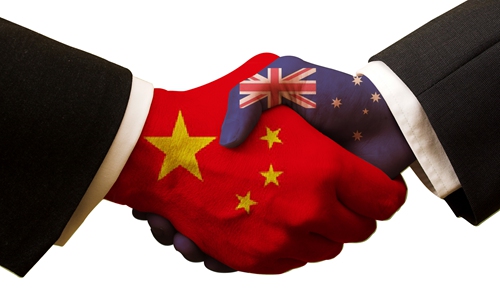HOME >> OPINION
Australia seems to favor prudent China policy
By Chen Hong Source:Global Times Published: 2020/1/2 20:05:00

Photo: IC
The year 2019 was full of contradictions and uncertainties for China-Australia relations. On one hand, bilateral trade hit new records. According to the Australian Financial Review, Australia's exports to China in the first seven months of the year have reached $84 billion, which works out to roughly $12 billion a month - 22 percent higher than the monthly exports of about $9.8 billion in 2018. Despite the occasional ill-advised and irresponsible calls for economic decoupling, China's position as Australia's largest trade partner will remain unshakable for the foreseeable future.
On the other hand, reckless politicians, journalists and some academics have been unleashing frequent unjustified castigations of China's governance system, internal affairs and diplomacy. Some media outlets even made use of a fraudster's incredulous account of fabricated Chinese espionage activities to persist with their Cold War-style fear and smear campaign against China. Political relations continue to be tempestuous and frosty with no signs of an immediate breakthrough.
With regard to Australia's US policies, while sticking to the traditional military and security ANZUS alliance, the Australian government has been exploiting Washington's pre-occupation with its Indo-Pacific Strategy, which manifestly purports to contain and suppress the peaceful rise of China, to consolidate and elevate Australia's strategic regional and global importance, in particular in the quadrilateral coalition of the US, Japan, Australia and India.
During his visit to the US in September, Prime Minister Scott Morrison worked in unison with US President Donald Trump to challenge China's status as a developing country. In January 2020 he is scheduled to visit India and Japan with the well-defined objective of intensifying all-around collaboration with the two countries.
Meanwhile, facing the increasing presence of China's aid and cooperation programs in the South Pacific, Australia has been redoubling its activities and boosting its aid volume to step up its influence in this region in order to keep itself as the principal political and economic leader among Pacific countries.
Acting in coordination with the anti-China camps and interest groups led by the US on a variety of issues including the passage of the so-called Foreign Influence Transparency Scheme and the blanket ban of Huawei in Australia's 5G network upgrade, former Australian prime minister Malcolm Turnbull and his foreign policymakers assumed an extremely hostile attitude and confrontational approach toward China, which brought the bilateral relationship to its historically lowest ebb.
Therefore, the legacy Morrison inherited from the previous Turnbull government regarding Australia's relationship with China is awkward, difficult and complicated.
In spite of the fact that Morrison lacked diplomatic experience before he took office, he is now the prime minister with the most overseas travel during the first year. It is clear that he has been doing the utmost to formulate his own diplomatic policies.
It has in fact been a fundamental test for Morrison to undertake judicious and prudent management of the bilateral relationship. It is noted that he has adopted a diplomatic philosophy and approach different from his predecessor's, with more proactiveness, balance and constructiveness.
In the speech he delivered in a Chinese community in 2018, as well as at the Asia Society and Lowy Institute in 2019, he proffered goodwill by indicating that in spite of systemic and other differences, both countries need to seek common ground for mutual interest.
Although he has not visited China since his ascension to the prime ministership, between June and November 2019 he sought avenues to have sideline meetings with Chinese leaders on international occasions in Osaka, Jakarta and Bangkok. During his meeting with Premier Li Keqiang in November, he stressed that Australia attaches great importance to its relations with China and is committed to promoting the development of Australia-China relations.
While commenting on Australia's diplomatic and strategic conundrum of relations with China and the US, he said Australia, as a sovereign state, does not need to choose between Australia-China relations and Australia-US relations, and will deal with China independently.
In dealing with the relationship with China and the US, Australia is on its way to developing increasing independence in the formulation of a more mature policy framework.
As the new year dawns, China does not expect Australia to make significant changes to its relations with the US, but we do look forward to a more realistic and constructive attitude in Australia's handling of its China policy.
The author is a professor and director of Australian Studies Center, East China Normal University. opinion@globaltimes.com.cn
Posted in: ASIAN REVIEW